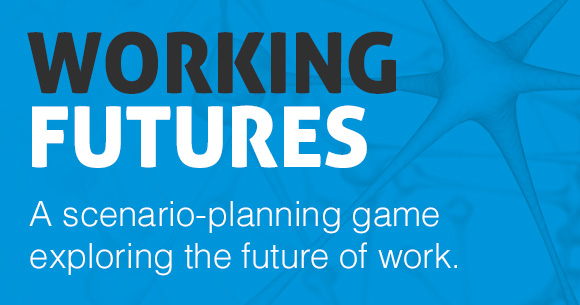Working Futures: The Future Of Work Is Likely To Be Complicated
from the but-it's-coming-either-way dept
Order your copy of Working Futures today »
On Wednesday we officially launched our Working Futures anthology, which is available at Amazon as both an ebook (for $2.99) or a paperback for ($9.99) or both together ($10.99). I really recommend the paperback, because it looks great. So far, we've been blow away with the support we've received and the excitement over the collection. The book has shot up the various best seller lists on Amazon, reaching in the teens for science fiction anthologies, and reaching #12 in the "new releases" category.
In the launch post earlier this week, I profiled the first three stories, so today I want to explore the next three -- which has some names that Techdirt readers will recognize... starting with me:
The Nole Edge Economy: I've been talking a lot about protocols over platforms lately, and wanted to explore such a world in a fictional context -- and combined two other elements: the incredible wealth of DIY info found totally free online such as on YouTube (I was inspired to write this after learning how to rebuild a carboretor via YouTube videos) and also the odd dependencies created by shareable, reusable code. Also, there'a little nod towards SLAPP suits as well. In short, this is a story that hits on a lot of regular Techdirt points.
eMotion: by our very own Timothy Geigner. He kept telling me he was too busy to write something, and then at the last minute delivered this wonderful story exploring what the world might look like when artificial intelligence is granted its own rights -- and starts to require what probably can't be called "human" resources any more when dealing with job changes and transitions. But, in such a world, certainly the line begins to blur between who gets to make decisions for whom. And, I mean, how do you let a military artificial intelligence know that its services are no longer needed...
Genetic Changelings: by Keyan Bowes was one of the few stories we received that didn't focus on artificial intelligence, but rather started exploring a world where genetic engineering has taken off to fairly spectacular levels. It's a world that will seem quite familiar to today's... but with a few potentially startling differences. I mean, when a story starts out in its first line discussing a child's tail, you know it's going to be a bit different.
We'll continue describing more stories next week, and we'll have some fun other stuff, including some of the authors on our podcast. I also wrote a short guest post at Boing Boing about the project, and wanted to highlight one point I made over there. These stories don't paint a dystopian or a utopian future -- but mostly somewhere in between. Indeed, some of the stories are being interpreted in very different ways, with one author letting me know that he thought his story was really optimistic, but someone who read it reacted the opposite way. As I wrote for Boing Boing:
Some stories are upbeat and optimistic. Some... not so much. Many are deeply, deeply, in between: stuck in a world where “it’s complicated” is a fair way to describe things. But all of them help paint possible pictures of what work might mean in the future.
And that's part of why I like this collection so much. I've said all along that I'm less impressed by the "it'll all turn out horrible" or "it'll all work itself out" viewpoints, because they don't tell us anything useful, and the reality is almost always somewhere in the middle. But that's a big spectrum, and it often includes elements of good things... and elements of bad. Mixed together. It's complicated. Just like real life.
Filed Under: future of work, scenario planning, working futures



